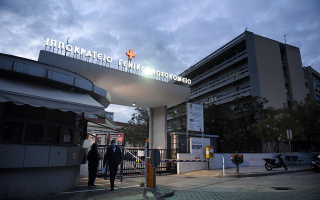Redesigning our health system

The pandemic has triggered a debate: How can we create a health service that can combat future crises, meet citizens’ everyday needs and be viable? The conjuncture is unique, as national and European leaders are now willing to prioritize funding for healthcare. The floor is open for debate and those involved are already submitting proposals. A rational and objective analysis of the way we handled Covid-19 is the only way for us to extract safe conclusions about the state of the health system.
Our Covid-19 response relied mainly on the public health system (large hospitals, university clinics and laboratories), which showed readiness to staff the managing committees. The University of Athens’ School of Medicine made all its clinics and labs available for advanced testing and research. The regional structures of our public health system functioned with many problems, highlighting its own deficiencies: an irrational distribution of people and resources and partisan mentalities. The private sector had a limited role, both in duration and impact, but proved that it can cooperate effectively with the state when asked to, complementing our public health system.
In view of the above, a modern National Health System (ESY) should be patient-centered, invest in prevention, rely on primary care and provide easy access to emergency services. As technology is now providing solutions that minimize unnecessary travel and suffering, local communities and political leaders need to understand that when everyone does everything, then healthcare is mediocre and expensive. Our priorities should be the following:
1. Redrawing the health map by merging clinics and hospitals, decentralizing services and developing new branches of medical science.
2. Building and modernizing public health units by introducing new technologies for diagnosis and treatment, creating a patient registry and electronic filing, utilizing the applications of the Fourth Industrial Revolution, AI and telemedicine.
3. Establishing centers of excellence on university campuses to provide specialized and high-cost treatments with an interdisciplinary approach.
4. Creation of prevention units for the most common diseases, and the integration of prevention studies in medical schools’ curricula.
5. Establishing emergency units for the effective evaluation and treatment of patients, focusing on proper allocation (currently, some hospitals operate at 150% capacity, while others in the same area are at 25%).
6. Closer cooperation between ESY hospitals and university clinics and labs for the continuous exchange of knowledge, biomedical research, training and programs of continuing education and specialization. Further, strengthening clinical research so that patients have free and early access to innovative treatments, and providing incentives to the pharmaceutical industry to invest in medical research, with transparent and oversight processes.
7. Recruitment of permanent staff to fill the large gaps created during the crisis. The University of Athens’ School of Medicine has lost 300 positions since 2010 due to retirements, which have not been replaced. The new design must place emphasis on the need to hire younger people, in a meritocratic way, giving them opportunities for professional growth. This is the only way to re-attract the talents that have moved abroad.
8. Radical review of employment relations in public hospitals, so that employees can work for the private sector depending on the level, specialization and evaluation of their work in the public sector.
9. The public sector must reassert its purpose and mission, along with its core values, with measurable goals, oversight mechanisms and the proper distribution of financial and human resources. The private sector should also be evaluated and encouraged to complement rather than compete against ESY. The framework for cooperation between the two sectors should be clearly defined, quality standards established and control mechanisms implemented.
If interdisciplinary cooperation between patients’ associations, social organizations, the state and healthcare providers is the only way of designing a reliable and modern healthcare system, its implementation requires consensus and bold political decisions. This opportunity must not be missed.
Konstantinos Syrigos is professor of medicine and oncology at the University of Athens’ School of Medicine.





